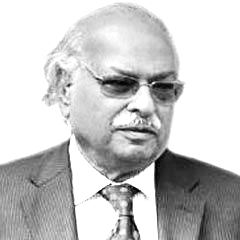“Justice delayed is justice denied” is a time-tested maxim. If a victim does not get legal redress from a court of law in reasonable time, it means that he is denied justice. Its best manifestation is available in the British Magna Carta in the dictum of the most famous writ of habeas corpus. It empowers the court to order the executive to produce “the body” of a victim, believed to be held in unlawful detention, before a judge immediately. This one legal provision has made British legal system perhaps the best and the most pristine in the world.
Before and during the martial law of General Ayub Khan or whenever the government of the day was oppressive, the writ of habeas corpus used to be the most popular and most often resorted to legal redress for a victim of high-handedness by the police or the administration. The beauty of the writ of habeas corpus was that it could provide instant justice.
Regretfully, the effectiveness of the writ of habeas corpus in Pakistan seems to have been lost in the wilderness of judicial activism, and it has rather been replaced by suo motu notices that could be taken on individual whims and eccentricities.
Using these notices, Chief Justice Iftikhar Chaudhry and his colleagues could fix prices of essential commodities without realising that fluctuation in rates depends on the principle of demand and supply. His main interests were personal glorification, pelf, power, and protocol, rather than pushing for speedier justice at all levels.
Regretfully, Justice Chaudhry was among those judges who legally endorsed General Pervez Musharraf’s dismissal of an elected government and legitimised the dictator’s fraudulent referendum. While suo motu is a different ball game, the setting up of military courts has perhaps made the writ of habeas corpus redundant for now. But that is a separate story.
Although one would not like to comment on cases pending before the five-judge bench of the Supreme Court, however, a brief reference of the case related to Dr Asim Hussain would suffice to expose the high-handedness of law-enforcers and the apparent failure of the judiciary to address the glaring instance of denial of justice through delay in the matter.
Dr Asim Hussain, a former Senator and a federal minister, was arrested in August 2015 by the Rangers and drowned into a plethora of charges of corruption involving billions of rupees and of providing treatment at his hospital of some alleged terrorists. Whatever the Rangers, the FIA or the NAB dished out against Dr Asim during his 19-month detention remained unproven till the time he was recently released on bail in a poor health condition.
This brings us to the popular media interpretation of Dr Asim’s release on bail by the Sindh High Court. Most TV channels have been heard parroting that it all happened because of a political deal between the PPP and the PML-N. I have listened to various channels and discussions on everything under the sun by so-called panels of experts that have included members of the legal fraternity and invariably a retired army general. No one was willing to give credit to the Sindh High Court judges for having given relief to Dr Asim that was long overdue. Pakistan Tehreek-i-Insaf leader Imran Khan was shown every five minutes in various programme repeating the allegation that Dr Asim’s release on bail was due to a ‘muk mukka’ (settlement) between the two parties.

Being a land of conspiracies that are hatched in every nook and cranny, Pakistan’s ‘muk mukka syndrome’ is also casting a shadow of doubt as to whether the outcome of the mother of all judgements (in the Panama Leaks case) would be on merit or not. The apex judiciary is caught in a Catch-22 situation. In is article “Panama and sugar woes”, leading columnist Ayaz Amir has said, “What is unfolding is certainly extraordinary, something they (the Sharif family) have never experienced before.”
Amir says that Sharifs have been in “the game of power and pocket-lining for a long time, the longest in Pakistan’s history. The Sharifs have had their indulgent judges who could be depended upon to return indulgent verdicts.” He believes that times have changed and options have dwindled. It is no longer possible to do what the PML-N managed so brilliantly in 1997 by storming the Supreme Court and sending Chief Justice (late) Sajjad Ali Shah home by using what martyred Benazir Bhutto used to call “chamak”, to influence a whole herd of judges to revolt against the Supreme Court chief justice.
While not in a position to predict what good or bad is around the corner, one hopes that those who matter in the apex judiciary, and towards whom all anxious eyes are riveted, would remember the wise words of President Mamnoon Hussain. Soon after the Panama leaks controversy started, Hussain had said that “the Panama leaks were a visitation from the skies, and to save the country from the curse of corruption it was imperative that one should get to the bottom of Panama leaks and pull out corruption from its very roots.”
The writer is the former High Commissioner of Pakistan to the United Kingdom and a veteran journalist.
